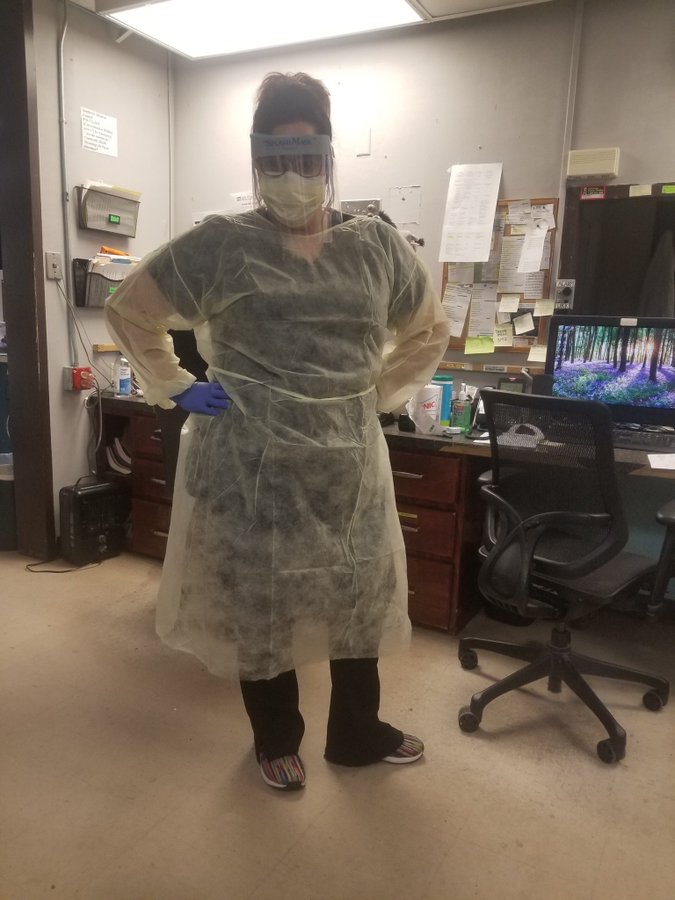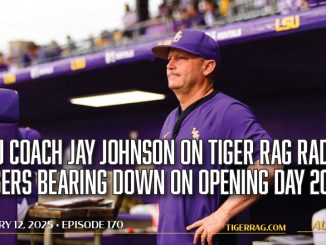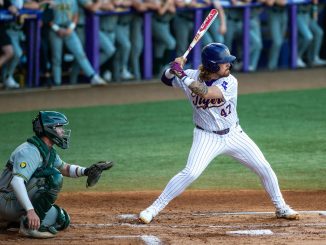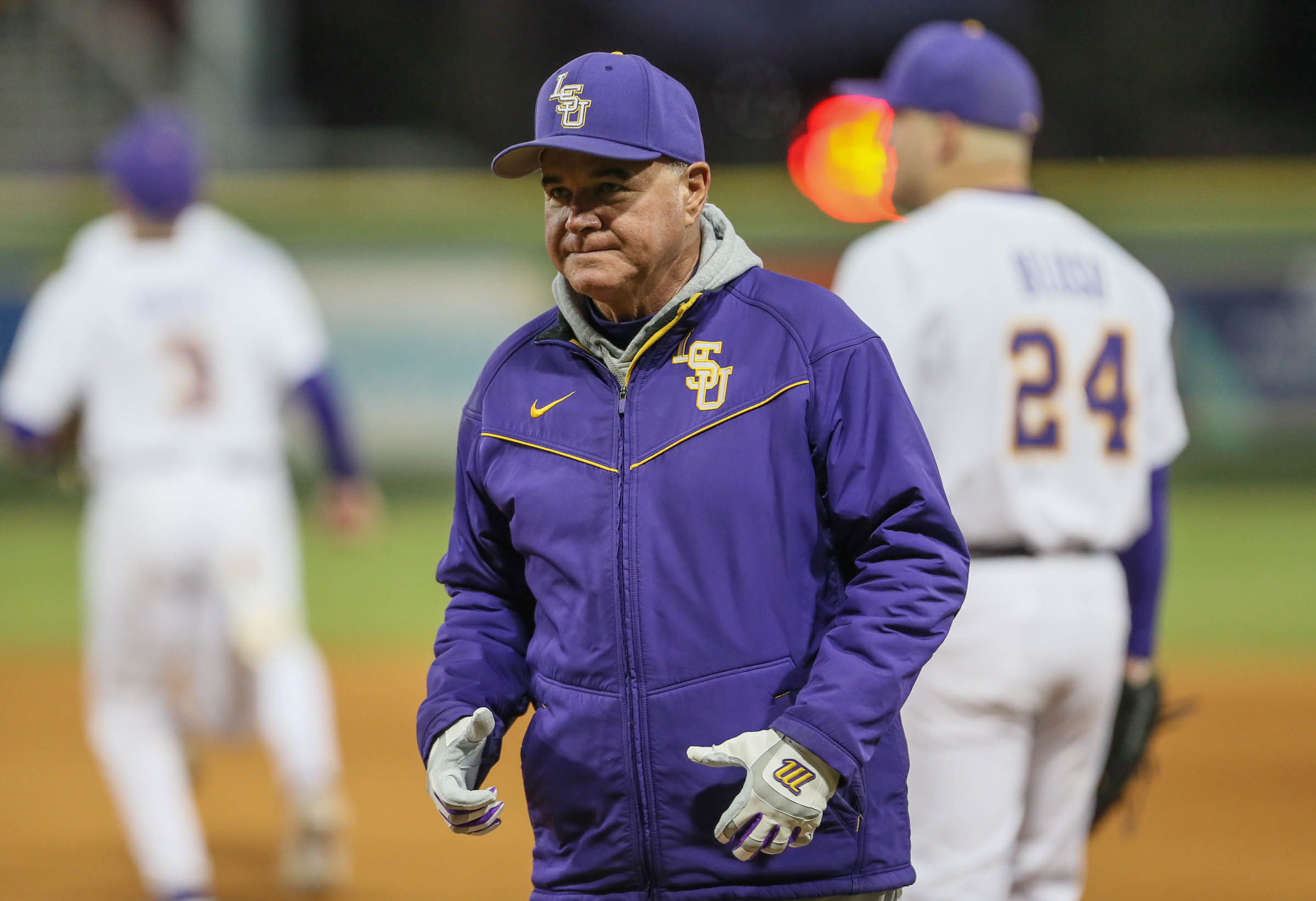
LSU sophomore baseball pitcher Jaden Hill didn’t really understand.
He assumed while growing up in his hometown of Ashdown, Ark., that superheroes were either fictional characters portrayed on a silver screen or genuine athletes completing herculean tasks within arm’s length of a television.
Then, came the current coronavirus pandemic and the role Nikki Hill – Jaden’s mother – has accepted during grueling 12-hour shifts as a nurse at Little River Memorial Hospital which still hadn’t reported any cases of COVID-19.
“She has to take care of patients and conduct the (coronavirus) screening,” Hill said of his mother, a nurse for the past seven years. “With her going to work, I don’t know if anything could happen to her. When I called her about it, she wanted to make sure everything was good with me and told me the precautions that I should take.
“It’s the risk that she’s going to work every day to help others. She could be exposed to it. You never know what may walk through that door. That’s why everyone gets screened for the virus.”
The phrases coronavirus and COVID-19 officially emerged on Hill’s radar nearly three weeks ago when the growing pandemic forced cancellation of LSU’s baseball season with the Tigers on the brink of starting Southeastern Conference play.
The Tigers had their bags on a bus headed for Ole Miss March 12 when coach Paul Mainieri asked his players to retrieve their belongings and head to the locker room for an impromptu meeting.
“It’s very disappointing for me because personally I’ve still never played against an SEC team, I haven’t played in a true away series,” said Hill, a 6-foot-4, 233-pounder right-handed flamethrower. “I was looking forward to the competition and Ole Miss being such a great hitting team. As a team, we were just getting hot and figuring stuff out. We were all excited of what was ahead of us.”
Especially Hill, who missed most of his freshman season because of discomfort in his elbow. He hadn’t allowed a run in four appearances – a stretch of 11.2 innings of work. He picked up a team-best two saves in his role as LSU’s closer, having struck out 17 batters and walked only five.
Hill was exceptionally sharp in a Feb. 28 outing against Texas in the Shriners Hospital for Children College Classic at Minute Maid Park in Houston.
Hill entered the seventh holding a 4-3 lead and delivered three scoreless innings without allowing a hit, striking out six of the nine batters he faced in gaining his first career save and eliciting the following from Texas coach David Pierce.
“I don’t know why Hill’s in college to be honest with you,” Pierce said afterward.
Mainieri feels the same way.
“He broke his collarbone his senior year and that set him behind with his pitching,” Mainieri said just four days before this season ended prematurely. “Had he not broken his collarbone he probably would have signed professionally coming out of high school. So, we were really kind of lucky that he came to school. We half expected he was going to sign.”
Despite the football injury, Hill was 7-0 with a 0.51 ERA as a senior, striking out 85 batters and walking 12. He also batted .540 with 11 home runs, 43 RBI, 35 runs and a 1.034 slugging percentage.
All that helped him win Gatorade state Player of the Year and he was the state’s top-rated prospect by Perfect Game and Prep Baseball Report. St. Louis drafted Hill in the 38th round, but he signed with LSU where his cousin Cedrick Harris, was the starting centerfielder for the Tigers’ 2000 College World Series championship team.
Hill quickly worked his way into LSU’s starting rotation a year ago, going 1-0 with a 1.80 ERA with 11 strikeouts over 10 innings in the first two weekends of the season.
He was honored as the SEC Freshman of the Week for his efforts in a five-inning outing against Air Force with eight strikeouts, four hits and one run.
After another five innings against Bryant that included three strikeouts, two hits and a run, Hill began experiencing pain in his elbow. He was sidelined for what proved the remainder of the season.
“Coming here and being a starter, it was a workload that I wasn’t used to, having to go against great hitters every day,” Hill said. “It took a toll and I don’t think my body was ready for that yet. I wasn’t dedicated to baseball and played other sports my entire life. I needed to get used to the workload.”
MRIs proved negative and Hill held out hope of returning for the SEC tournament. He began throwing and made the training room a required stop daily. But before he could throw in a simulated game, the pain returned and put an official end to this season.
“I wanted to pitch and that’s what I was going to do but we all came together and felt it was best for me to shut it down,” he said. “I took a different approach to figure out the problem. The rest of spring, summer and fall gave me plenty of time and I’m thankful they did it.”
Hill made substantial gains in the weight room, adding an additional 15 pounds going into his sophomore year. More importantly, the increased strength breathed extra life to already devastating 91-93 miles-per-hour fastball to complement an effective curveball, slider and change-up.
Hill felt revitalized in the fall when only his mental and physical outlook outweighed that of his overall health.
His confidence wasn’t far behind, getting reminders on the challenges he faced trying to get LSU’s batters out. That left him looking at the opportunity of regaining a starting role or fulfilling the all-important closer role.
“The fall turned out great, I had time to figure out myself,” Hill said. “We have the best hitters in the SEC. To able to compete and not get rocked every day gave me a lot of confidence. There’s no excuses when you’re going to go out there and give it your all no matter what.”
Mainieri noticed Hill’s velocity had increased to the upper 90s, which meshed nicely with already established intangibles.
“He’s got great poise and he’s a competitor,” Mainieri said. “So, when you put it all together, it gives you a pretty special kid.”
Hill never belabored where he would fit into the team’s pitching plans this season, only focusing on being healthy and ready when called upon.
LSU’s weekend starting rotation consisted of Cole Henry, Landon Marceaux and A.J. Labas with Hill wanting to take on the responsibility of coming out of the bullpen and closing games.
He couldn’t have been more ecstatic with his first two outings – which were both in no-save opportunities – throwing a total of 4.2 scoreless innings with one hit, with strikeouts and four walks.
“It felt great, I was out there playing again,” he said. “I sat out last year and it really hurt me emotionally because I wanted to go out and help the guys. When I felt I should be out there helping I wasn’t able to. Being able to go out there and successfully compete meant a lot to me and I think it brought a lot of joy to my teammates with the way they responded.
“I want to be able to bring energy to the team, I want to be able to go out there and they know I’m giving it my all. That brings confidence back to me. I wanted to be that positive influence for the team.”
Then, came his third outing, a true challenge against a Texas team that had opened the season 9-0.
After Henry retired Texas in order in the top of the sixth, the Tigers scored twice in the bottom half of the inning and presented Hill with a 4-3 lead going into the top of the seventh.
Hill struck out the first three batters he faced, then pitched around a one-out walk with a pair of strikeouts to cap the eighth. He set the Longhorns down in order in the ninth and recorded the first save of his career.
“I just honestly wanted to pitch,” he said. “At the end of the day, if I had gone back to be being a starter that would have meant Cole, A.J. or Landon weren’t doing their jobs. I didn’t want that. I wanted them to be doing great and I wanted to back them up when coach and the team needed me.”
Hill had one final tune-up for the start of SEC play with a four-inning relief effort of Marceaux in a 12-2 victory over UMass Lowell. He worked a perfect four innings on 37 pitches, registering three strikeouts with an eye toward the Ole Miss series which would have represented his first SEC road series.
However, it never took place, and neither did the rest of the season.
There were initial feelings of sadness for teammates such as Zack Mathis, Daniel Cabrera and Cade Beloso, who were beginning to hit their offensive strides. But Hill also dealt with the angst of potentially watching senior pitcher Matthew Beck’s career end.
“The first week it was very disappointing, no one knew what was going on and things changed drastically,” said Hill, who began taking LSU online classes Monday. “Being able to sit back and look at how big this thing truly is, it’s bigger than baseball. It’s bigger than me selfishly wanting to go out to pitch. I’m doing something I love but at the end of the day we’re talking about people’s lives and their health.”
Hill needed no greater illustration of that, learning of the superhuman efforts of the doctors and nurses, including his own mother, who have bravely treated and cared for as many patients as possible trying to stem a global pandemic.
“Superman used to be your hero growing up or a favorite sports athlete,” Hill said. “It’s actually the people who are putting their lives at risk every day such as firefighters, nurses, doctors. It takes something like this for us to realize what they go through on a daily basis.
“With this going on their lives are literally in danger. It makes me look up to my mother even more than I would ever have. It’s used to be, ‘There’s my mom’. You love her no matter what. Now you know she’s truly a hero in my eyes.”




Be the first to comment